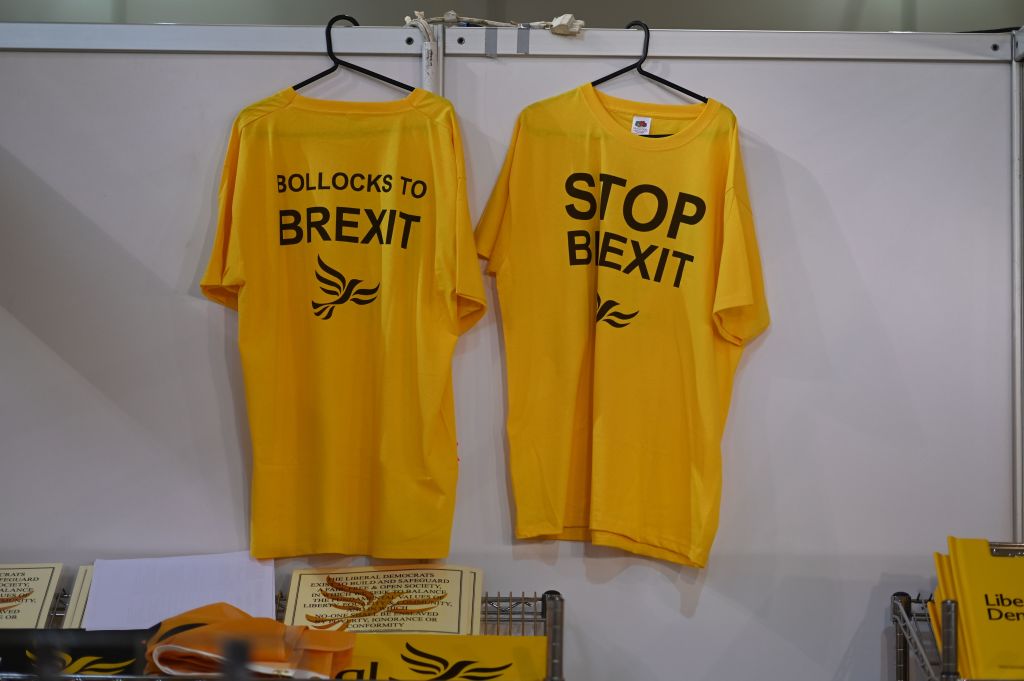Lib Dem conference in Bournemouth is proving to be a jolly affair so far. I’m writing this in the garden of the Highcliff hotel, looking out over the Channel that divides the UK from France and, perhaps one day, the European Union.
It’s Brexit that’s making the Lib Dems happy as they bustle by. Parties are generally happy when they feel they have a clear line on big issues, and the Lib Dem line on Brexit is now crystal-clear: cancel it.
Partly because they expect a big Labour shift towards a clear Remain position, the Lib Dems are now, in headline terms, committed to revoking the Article 50 notification and thus returning UK membership of the EU to its previous permanent status.
There are all sorts of political problems with this, but I’ll leave the electoral interpretation to others.
My big issue with the clear new Lib Dem position is that it’s built on a fantasy, sold on a false premise. It’s every bit as much a unicorn as the impossible dreams conjured up by the hard Brexiteers who spin stories of a clean break from Europe and a Britain that focuses on the wider world instead.
The Lib Dem fantasy is actually quite close to the “clean break” unicorn.
Here’s Jo Swinson on Radio Four:
“When we have an election if we haven’t had a People’s Vote, people will be looking to resolve the issue of Brexit…there are so many people in this country who are sick of hearing about it….”
And here’s Chuka Umunna, newly-minted Lib Dem MP:
“This will stop the national embarrassment and enable us to focus on the things that really matter.”
Yes, the Lib Dems are arguing, with straight, earnest faces, that cancelling Brexit would “resolve the issue” and allow British politics to move on and focus on other things.
This is silly, about as silly as the No Dealers who claim that leaving without an agreement will allow us to move on from obsessing about the EU and talk about other things.
Imagine, for a second, the circumstances in which that Lib Dem promise was delivered and the Article 50 process stopped. It’s not, I suggest utterly improbable. It’s just about possible to sketch out the scenario where the coming general election means the only majority in the Commons is held by a very loose alliance of Lib Dems, Labour (shorn of its Leave-voting seats), nationalists and maybe some Independent Conservatives. Across a Commons now firmly divided on Leave/Remain lines, they would face Boris Johnson’s Conservatives, perhaps some Brexit party members, and perhaps some Independent Labour Leavers.
Such a Parliament might well boil down the Brexit decision to a hard binary – No Deal or No Brexit – and decide on cancellation.
Would that, to use Swinson’s phrase, “resolve the issue”? Would all 17-odd million people who voted for Brexit simply shrug and say, “Oh well, that’s representative democracy for you. I respect the decision of the democratically-elected House of Commons”?
And would the politicians those voters had sent to the Commons calmly accept the decision, accept that Brexit was now settled and move on to talking about rural buses or fiscal policy or schools reform?
I politely suggest they would not do so. Cancelling Brexit would only mean that political debate was about nothing but Brexit for many more years: all future elections would be fought over whether to leave (again) or not. All those important issues would be ignored amid the endless, angry battle between politicians defending cancellation and those seeking to end EU membership.
That’s not the end of the story of why cancellation would be disastrous. It would hasten our descent into the politics of the culture war, where the rules and institutions of representative democracy are thrown aside.
I still believe, quite strongly, in the primacy of Parliament and defend its right to decide things. But I think that simply voting to annul Brexit, as the Lib Dems now suggest, would do vast harm to Parliament as an institution. I can think of no better gift to give to those who would win votes by telling “the people” to be angry with “the politicians” than for Parliament to live up to the worst fears of Leavers by simply deciding that voters who want Brexit can’t have it.
Cancelling Brexit is the politics of the quick fix for Remainers who haven’t faced up to the scale of their (our) defeat in 2016. There are a lot of people involved in Remain politics who talk as if Brexit was the result of a few years of internal Conservative party politics, that the referendum came about because of some (mistaken) decisions David Cameron made in 2012 or 2013, then voters chose Leave because of evil Russian Facebook robots or something.
And indeed, if that’s your explanation for the Leave vote, it probably makes sense to think you can reverse that decision quickly and simply. If you think Brexit was the product of voters’ stupidity, politicians’ dishonesty and the meddling of dark forces beyond Britain, “Cancel Brexit” is a fair response. It certainly makes Lib Dem members happy as they enjoy the Bournemouth sunshine.
But if you accept that the Leave vote was the product of many more years of building pressure, of political campaigning, of media failures and public frustration, it’s impossible to believe in a quick fix. The Brexit vote was decades in the making; reversing it in a sustainable, legitimate way could take as long. But then “Leave with a Deal then Argue to Rejoin the EU” isn’t quite as snappy a slogan, is it?







Comments